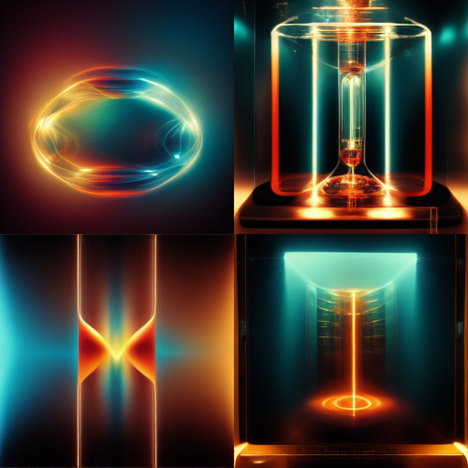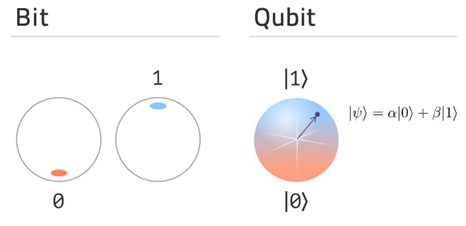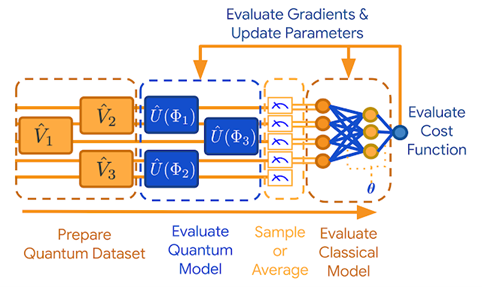Quantum Machine Learning - hot or not?
3 years ago

Image generated with Midjourney API, “Quantum Computing”
The blogs so far have been based on facts and knowledge backed by both relentless theory, empirical experience and evidence in the form of practical solutions. Today's article will be of a slightly different nature and will focus on a field still in development, rather in its empirical infancy, which is still far from generating practical real-life solutions. We are talking about quantum computing (QC) - a field with which the technological world on the one hand associates computational salvation, and on the other fears irreversible change in some of the systems on which our technological civilization operates. It is worth quoting at this point the words of the great Polish visionary and science-fiction writer Stanislaw Lem:
The risk can be of any magnitude, but the very fact of its existence implies the possibility of success
~ Stanisław Lem, The Magellanic Cloud
Quantum computing from a theoretical perspective is the computing power to break today's ciphers securing our money in the bank in a short period of time, but there is still uncertainty whether the barrier between theory and practice will not prove to be too high, in terms of physical possibilities, in the context of the coming years. I believe, however, that it is worth pointing your gaze to the future, even if uncertain. After all, even 30 years ago few would have believed in solutions that today we take for granted and perhaps even boring everyday life.
Known areas where quantum computing can lead to a revolution are, e.g., the design of new drugs and materials, the improvement of artificial intelligence and optimization tasks such as fleet management of taxis, trucks, ships, etc. As quantum computers are increasing in maturity, research on algorithms that are dedicated to utilising the power of quantum computers is moving from being a niche that only a few people look at theoretically, to an active area of research on a larger scale. More practically relevant application areas are expected in the future.
In today's blog we will focus on a particular field where QC is likely to find its application - quantum machine learning. An area combining quantum computing with classical machine learning, something we at Digica like the most :)
The basis of quantum computing - qubit as a carrier of information
Where lies the computational power of quantum computing? A qubit, a bit of quantum information, has an unusual feature, derived from the laws of quantum mechanics: it can be not only in state 0 and 1 at the same time, but also a little bit in 0 and a little bit in 1 - it is in a superposition of two states. Similarly, eight qubits can be in all states, from 0 to 255, at once. The implications of this are momentous. A classical byte requires reading a sequence of bits, and the processor processes only one bit at a time. A qubit, which is actually a kind of probability cloud that determines the possibility of each state, allows all these states to be processed simultaneously. So we are dealing with parallel processing, which in modern electronics would correspond to the use of multiple processors.

Comparison of bit and qubit states.
[https://blog.sintef.com/digital-en/diving-deep-into-quantum-computing/]
The performance of quantum computers does not depend on any clocks - there are none here at all. Performance is determined by the number of qubits. Adding each additional qubit pays off by doubling the speed of computation. In a single act of reading we would then receive information, for the processing of which a classical computer would consume centuries. The juxtaposition is striking: in order to achieve performance exceeding the best modern supercomputer, it is “enough” to construct a device consisting of around 1 million qubits (equivalent to 21000000 classical bits).

IBM Q Quantum Computer; Photo by Lars Plougmann [https://newrycorp.com/insights/blog/technology-readiness-of-quantum-computing/]
When discussing the possibilities of quantum computing, we must also take into account the existing problems the technology faces in the empirical field. Quantum computers are exceedingly difficult to engineer, build and program. As a result, they are crippled by errors in the form of noise, faults and loss of quantum coherence, which is crucial to their operation and yet falls apart before any nontrivial program has a chance to run to completion. This loss of coherence (called decoherence), caused by vibrations, temperature fluctuations, electromagnetic waves and other interactions with the outside environment, ultimately destroys the exotic quantum properties of the computer. Given the current pervasiveness of decoherence and other errors, contemporary quantum computers are unlikely to return correct answers for programs of even modest execution time. While competing technologies and competing architectures are attacking these problems, no existing hardware platform can maintain coherence and provide the robust error correction required for large-scale computation. A breakthrough is probably several years away.
Quantum Machine Learning
Machine learning (ML) is a set of algorithms and statistical models that can extract information hidden in data. By learning a model from a dataset, one can make predictions on previously unseen data taken from the same probability distribution. For several decades, machine learning research has focused on models that can provide theoretical guarantees of their performance. But in recent years, heuristics-based methods have dominated, in part because of the abundance of data and computational resources. Deep learning is one such heuristic method that has been very successful.
With the increasing development of deep machine learning, there has been a parallel significant increase in interest in the ever-expanding field of quantum computing. Quantum computing involves the design and utilisation of quantum systems to perform specific computations, with quantum systems defined as a generalisation of probability theory that introduces unique system behaviours such as superposition or quantum entanglement into reality. Such novel system behaviours are difficult to simulate in classical computers, so one area of research that has growing attention is the design of machine learning algorithms that would rely on quantum properties to accelerate their performance.
The ability to perform fast linear algebra on a state space that grows exponentially with the number of qubits has become a key feature motivating the application of quantum computers for machine learning. These quantum-accelerated linear algebra-based techniques for machine learning can be considered the first generation of quantum machine learning (QML) algorithms, which address a wide range of applications in both supervised and unsupervised learning, including principal component analysis, support vector machines, k-means clustering and recommender systems (https://arxiv.org/pdf/2003.02989.pdf). The main deficiency that arises in these algorithms is that proper data preparation is necessary, which amounts to embedding classical data in quantum states. Not only is such a process poorly scalable, but it also deprives the data of the specific structure that gives advantages with classical algorithms while questioning the practicality of quantum acceleration.
Quantum Deep Learning
When we talk about quantum computers, we usually mean fault-tolerant devices. They will be able to run Shor's algorithm for factorization (https://arxiv.org/abs/quant-ph/9508027), as well as all the other algorithms that have been developed over the years. However, power comes at a price: in order to solve a factorization problem that is unfeasible for a classical computer, we will need many qubits. This overhead is needed for error correction, since most quantum algorithms we know are extremely sensitive to noise. Even so, programs running on devices larger than 50 qubits quickly become extremely difficult to simulate on classical computers. This opens up the possibility that devices of this size could be used to perform the first demonstration of a quantum computer doing something that is unfeasible for a classical computer. It will probably be a highly abstract task and useless for any practical purpose, but it will be proof-of-principle nonetheless. It would be a stage when we know that devices can do things that classical computers can't, but they won't be big enough to provide fault-tolerant implementations of familiar algorithms. John Preskill coined the term "Noisy Intermediate-Scale Quantum" (https://arxiv.org/abs/1801.00862) to describe this stage. Noisy because we don't have enough qubits for error correction, so we will have to directly exploit imperfect qubits in the physical layer. And "Intermediate-Scale" because of the small (but not too small) number of qubits.
By analogy, just as machine learning evolved into deep learning with the emergence of new computational capabilities, with the theoretical availability of Noisy Intermediate-Scale Quantum (NISQ) processors, a second generation of QML has emerged based on heuristic methods that can be studied empirically due to the increased computational capabilities of quantum systems. These are algorithms using parameterized quantum transformations called parameterized quantum circuits (PQCs) or quantum neural networks (QNNs). As in classical deep learning, the parameters of PQCs/QNNs are optimised against a cost function using black-box optimization heuristics or gradient-based methods to learn representations of the training data. Quantum processors in the near term will still be quite small and noisy, so distinguishing and generalising quantum data will not be possible using quantum processors alone, so NISQ processors will have to work with classical coprocessors to become effective.

Abstract pipeline for inference and training of a hybrid classical-quantum model
[https://arxiv.org/pdf/2003.02989v2.pdf]
Conclusions
Let's answer the question in the title of the article - Is Quantum Machine Learning hot or not? The possibilities opened up by the laws of quantum mechanics when used for quantum computing are extremely enticing and promising. In the context of machine learning, the acceleration of many of the algorithms of both classical machine learning and deep learning instils excitement and seems to be a technology that offsets some of the pains that existing classical solutions encounter. Unfortunately, things that are possible in theory sometimes have a technological barrier in front of them, which is especially true for quantum computing. Nevertheless, in my opinion Quantum Machine Learning is hot, and although it may seem like a distant prospect, it does not detract from its advantages and the many solutions it carries. As is often the case in life, let time tell.